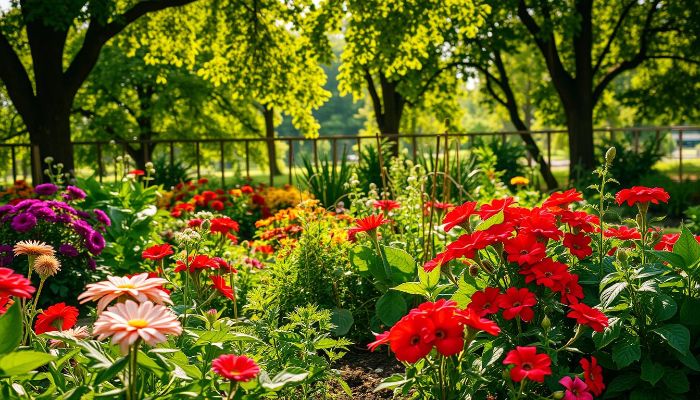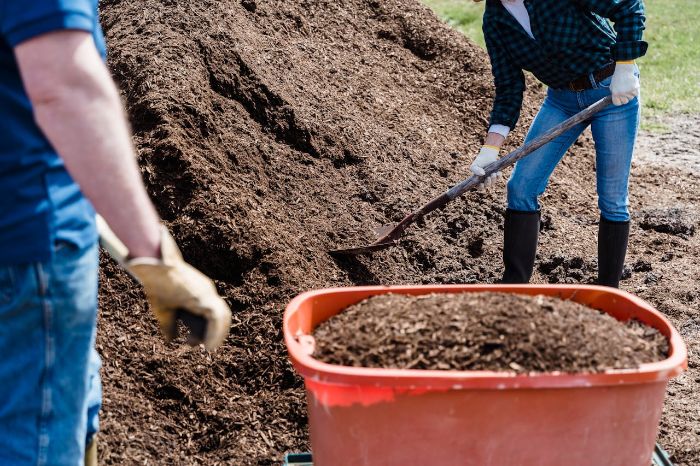Can getting your hands dirty in the garden truly benefit your mental health? Gardening is a beloved pastime for millions worldwide, and it’s not just about staying physically active.
Community gardens make cities look better. They also help people’s mental health by building resilience. Gardening makes people feel better and stronger than those who don’t garden.
Gardening can make you stronger and improve your memory. It also lowers anxiety by releasing dopamine. This shows gardening is good for your mind, not just a story.
Being in green spaces or gardening lowers stress and bad feelings. Touching plants can calm your heart rate and blood pressure. It even relaxes your muscles.
In busy cities, gardening in community gardens helps a lot. It shows we should add more green spaces to cities to make everyone happier.
Key Takeaways
- Community gardens provide significant mental health benefits by fostering resilience and reducing anxiety.
- Gardening activities can lead to sustained improvements in conditions like depression and life satisfaction.
- Spending time in green areas or engaging in therapeutic gardening reduces stress and negative emotions.
- Direct contact with plants is linked to lower heart rate, blood pressure, and muscle tension.
- Urban planners should consider integrating community gardens to enhance communal well-being.
Table of Contents
How Nature and Gardening Improve Mental Health
Being in nature and gardening can really help your mental health. Being around green spaces lowers stress and boosts well-being. Gardening adds physical and mental benefits to these activities.
The Therapeutic Effects of Green Spaces
Green spaces are key for better mental health. Therapeutic garden design strategies lower stress hormones by 16% and alleviate anxiety and depression symptoms by up to 36%.
These spaces work through stress reduction and attention restoration. Both theories show nature’s healing power.
Studies show plants have big benefits for mental health. Japanese research found plants reduce stress and anger. A British study found gardens are better for mental health than shopping areas.
Gardening as a Mindful and Stress-Relieving Activity
Gardening is great for your mind and stress levels. Incorporating daily gardening routines can equate to 250–300 minutes of exercise weekly, raising self-esteem by up to 50%.
People with ADHD see their focus improve by gardening. This fits with the Attention Restoration Theory, which says nature helps us focus.
Joining community gardens is good for mental health. Almost 60% of people feel more connected to their community. Isolated people feel 50% happier when gardening.
Stress Reduction Through Community Gardening
Community gardening is great for both your body and mind. It’s not just about making your garden look nice. It also helps you feel better by bringing people together.
As outlined in the foundations of community gardening, people who garden often report higher happiness levels and improved mental health.
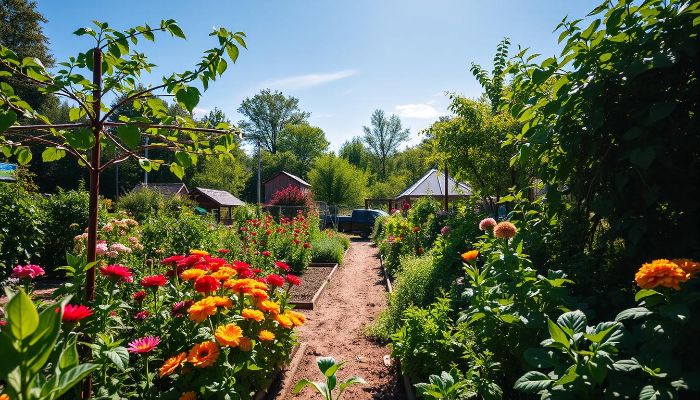
Physical Activity and Its Role in Stress Relief
Gardening is a workout. Activities like digging and planting can burn calories. This helps meet exercise goals and lowers stress.
A study found that gardening can make you feel better about yourself. Gardeners are more resilient and optimistic than others.
Disconnecting from Technology and Daily Pressures
Gardening also helps you take a break from technology. It offers a peaceful place to relax and improve your mental health. This break from digital life helps you connect with nature.
Research shows gardening can reduce depression and anxiety. This makes gardening a powerful tool for mental health.
Community gardens are now part of city life. Programs like Community in Bloom have created over 1,000 gardens in Singapore.
Gardening is a complete way to reduce stress and improve well-being. It also has social and environmental benefits, making it key to modern city living.
Boosting Mood and Emotional Well-Being
Gardening is great for our mood and emotional health. Being in nature has a big impact on our happiness.
The Positive Impact of Outdoor Activities on Mood
Gardening is key for feeling better. It can make us feel more confident and calm. Sharing what we grow makes us feel even happier.
Sense of Accomplishment from Growing Plants
Watching plants grow makes us feel proud. It boosts our self-worth and happiness. Learning new things, like gardening, makes us feel more confident.
Being part of a community garden makes us feel connected. It improves our sense of belonging. Working together in a garden brings us joy and a sense of accomplishment.
Combating Social Isolation and Loneliness
Community gardens help fight social isolation and loneliness, mainly for older adults. As more people turn 65, tackling loneliness is crucial. By building social networks through community gardens, gardening together fosters connections, giving a greater sense of belonging and purpose.
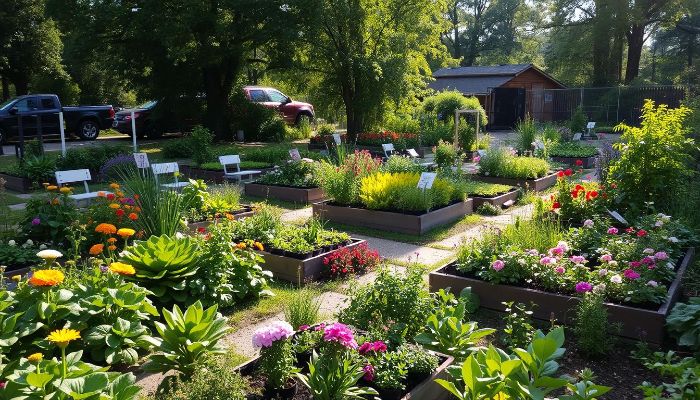
Creating Meaningful Social Connections
Studies show loneliness and isolation can harm health, like heart disease and depression. Community gardens offer a place to make real friends. This is key in fighting loneliness and boosting happiness.
Inclusive Spaces for All Age Groups
Community gardens welcome everyone, no matter their age or ability. They bring together different ages and cultures. This helps fight loneliness by letting older adults connect with the young, share wisdom, and help their communities.
Isolation can lead to longer hospital stays and even death. So, the benefits of community gardens are vital. They help build strong friendships, fighting loneliness and its dangers.
Building a Sense of Purpose and Responsibility
Being part of community gardens is more than just growing plants. It gives people a deep sense of purpose and responsibility. It helps grow personally and builds stronger bonds in the community.
Setting and Achieving Personal Gardening Goals
Setting gardening goals helps people grow personally. Planning, caring for, and harvesting plants teaches discipline. It helps achieve goals and boosts self-confidence.
Reaching these goals feels very rewarding. Every success is a personal win.
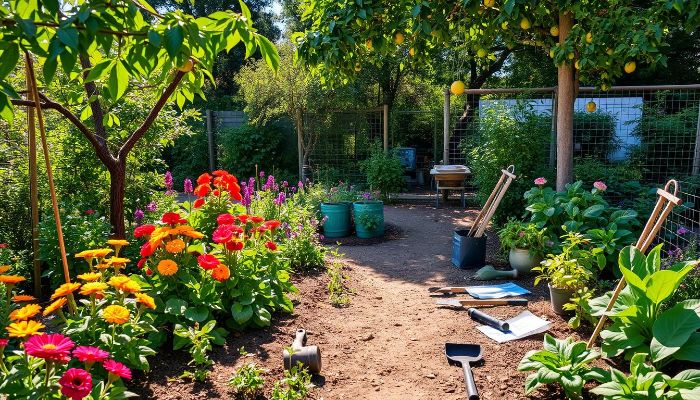
Contributing to Community Success
Community gardens offer a chance to give back. Working together and sharing gardening skills helps everyone succeed. This teamwork improves public areas and brings people together.
It leads to better social connections, mental health, and a strong sense of belonging. Community gardening is a win-win for everyone.
Enhancing Cognitive Function and Focus
Gardening is great for your brain. It helps you focus better and learn more. Gardening needs your full attention, which makes your brain stronger. It might even lower your risk of getting dementia.
The garden is a calm place. It helps keep your mind clear and healthy.
Stimulating the Mind Through Hands-On Learning
Community gardens are perfect for learning by doing. This way of learning is fun and boosts your brain power. Studies found that 60% of gardeners got better at remembering things and paying attention.
Gardening makes you think critically. It’s good for your brain’s health.
Improving Concentration Through Gardening Tasks
Gardening tasks like planting and weeding need your full focus. People who garden show a 15% better focus than before. Gardening helps you stay sharp and focused.
Being in nature also improves your focus. Gardening can make you 20% better at paying attention. It’s a great way to keep your mind sharp.
Sustainable Practices for Long-Term Mental Wellness
Adding sustainable gardening to your daily life can boost your mental health. Almost 70 million Americans struggle with sleep each year. Gardening can help by creating calm habits.
Studies show that eating foods from your own garden can make you happier. This shows how important gardening is for our well-being.
Incorporating Gardening into Daily Routines
Gardening can be a big part of your daily life. It mixes physical activity with mindfulness. This helps you relax and focus better.
Watching plants grow and harvesting them is very rewarding. It gives you a sense of pride and purpose. This connection with nature improves your mental health.
Being in nature and gardening can really help your mental health. Being around green spaces lowers stress and boosts well-being. For those looking to deepen their practice, mindful gardening tips for beginners outline simple ways to stay present and reduce stress during each gardening task.
Encouraging Ongoing Community Involvement
Community gardens play a vital role in promoting mental wellness. They bring people together, fostering a sense of connection and belonging, which is essential for our mental health. Social connections are crucial for well-being – they help us live longer, feel happier, and maintain better mental health. Gardening as a group strengthens our communities and gives us a shared sense of purpose.
FAQ
What are the mental health benefits of participating in community gardens?
Community gardens help a lot with mental health. They make you feel better and less stressed. You get to be active and meet new people, which is good for your mind.
How do nature and gardening improve mental health?
Being in nature and gardening lowers stress and boosts your mood. It helps you feel better after being tired. Studies show it’s really good for your mind.
What are the therapeutic effects of green spaces on mental health?
Green spaces like gardens are great for your mind. They make you feel less stressed and happier. They even help your mood come back to normal.
How does gardening serve as a mindful and stress-relieving activity?
Gardening is a way to relax and focus on the moment. It’s like a workout for your mind. It helps you forget about daily worries and tech.
Can community gardening reduce stress through physical activity?
Yes, gardening is a workout. It makes you sweat and feel better. It’s a fun way to stay active and reduce stress.
How do community gardens help with digital detox and relieving daily pressures?
Gardens are peaceful places away from tech. They help you relax and forget about daily stress. It’s good for your mind and helps you feel calm.
What is the positive impact of outdoor activities on mood?
Gardening and being outside make you happier. The fresh air and exercise boost your mood. It’s a great way to feel better.






